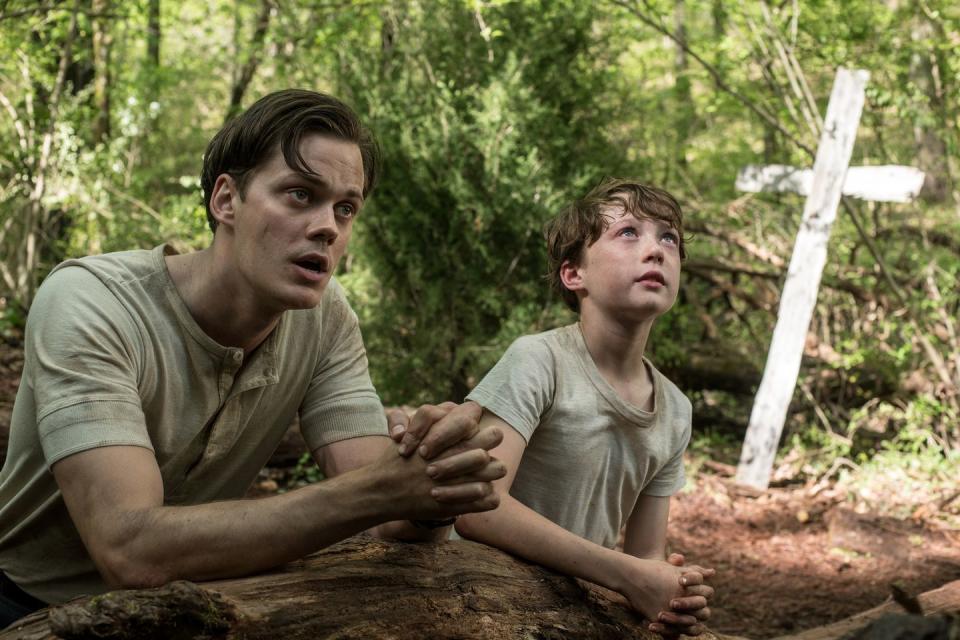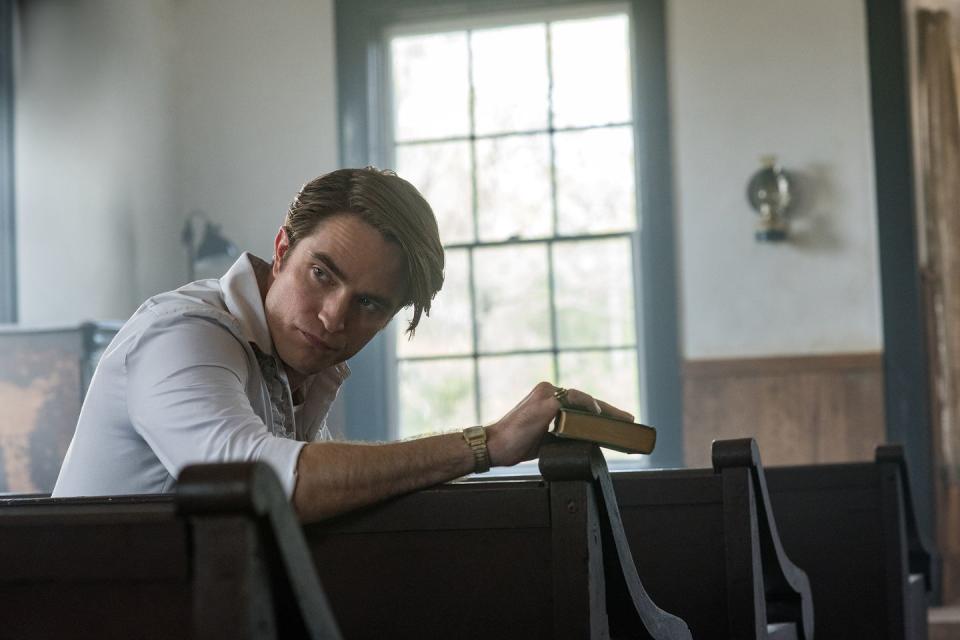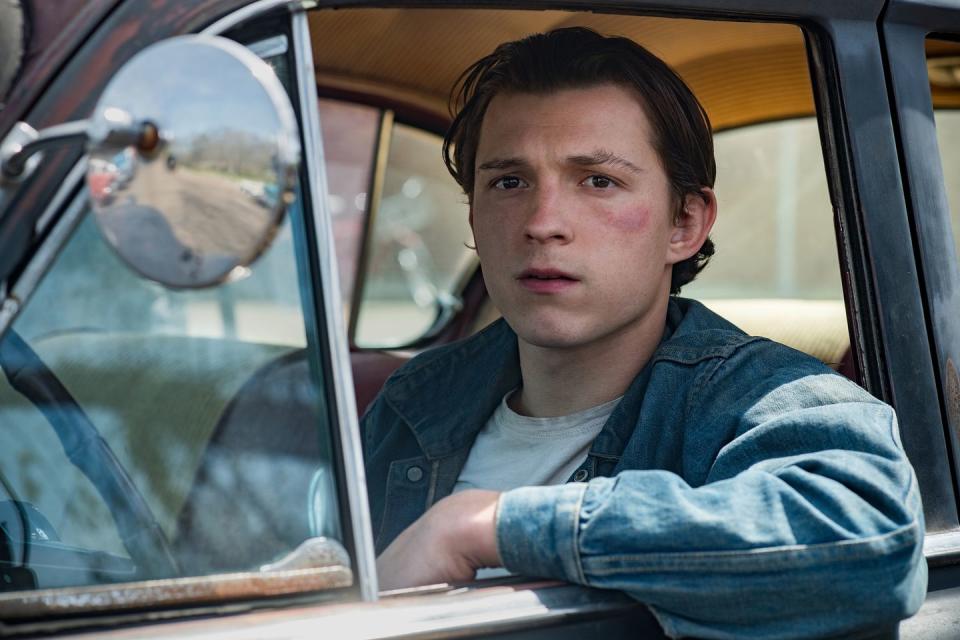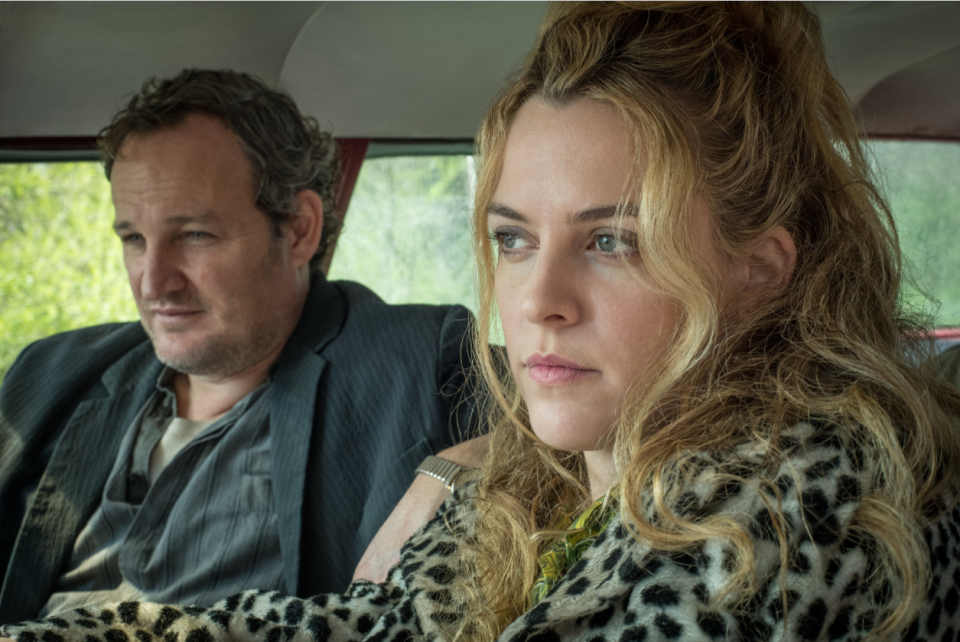'The Devil All The Time' Director Antonio Campos: "Robert Pattinson Brought His Own 'Madness'"

Revenge is swift and violence frequent in The Devil All the Time, Netflix's new adaptation of Donald Ray Pollock's 2011 novel. The film spans several generations and communities around Knockemstiff, Ohio, and tells the story of a PTSD-afflicted second world war veteran called Willard, his son Arvin, and the crooked preachers and bloodthirsty bandits who circle their story like vultures.
The lacklustre heroes and willing villains of the film are played by an impressive cast, which includes Bill Skarsgård as the shell-shocked Willard, Tom Holland as his solitary son Arvin, Robert Pattinson as the honey-tongued Reverend Preston Teagardin, as well as Mia Wasikowska, Riley Keough, Eliza Scanlen and Sebastian Stan.
Directing the film is Antonio Campos, the auteur behind The Sinner who also produced the dizzying Martha Marcy May Marlene, which recalls a young woman's fractured memories of living with a cult. Earlier this month Esquire spoke to Campos over Zoom to discuss adapting Pollock's sprawling book, the ways in which religion and violence are passed between generations in the film, and his good fortune to be releasing something that doesn't rely on a cinematic release.
What to your mind is this a story about?
To me it’s a generational story about the way we pass down so much to our children. Arvin had a father who was suffering from PTSD which was never treated or addressed, and so he inherited this very complicated relationship with religion and relied on violence to solve his problems. Then you learn that the Sandy character is related to Sheriff Lee Bodecker and that their father abandoned them early on, leaving them with this very bleak world view. Lenora is a product of her mother and father’s relationship to religion, and so it's this idea of a generational story but in the genre of southern gothic and noir.
Arvin’s character starts off very innocent but becomes corrupted by what he witnesses. How did you work with Tom Holland to bring those to scenes to life?
Tom tried to understand what Arvin had gone through and how that would affect the way that he saw the world. He’s not just a fucked up kid, he has a humanity and a heart and I think Tom is an incredibly soulful person. With the darker elements he really went there and allowed himself to get into that headspace when he had to. That character doesn’t really say what he’s feeling, he holds it back and so you’re really wondering what’s he’s feeling.

Reverend Teagardin is a magnetic character who really commands your attention. What were some of Robert Pattinson's inspirations for that role?
We looked at a lot of different YouTube videos of evangelical preachers and also the pop-stars of the time, like listening to interviews with Elvis and hearing the way he would talk. Then Rob’s own madness; he had his own process and was on his own consuming a lot of different references. I didn’t really hear the accent until we started to shoot, he really showed up in character and showed me Teagardin for the first time.
Did he stay in part throughout the filming process?
He would let it go and come back, he’s very fluid like that. I would say: "Don’t be scared to go as far as you want to go, throw it all out there and let’s see where it goes". And sometimes he’d go so far he’d make himself laugh and even in those takes we might get something brilliant, but it was like he would kind of zero in and be in it. The performance is almost closer to a possession than it is a performance.

The film has the book's author, Don Pollock, as the narrator. Did you always want to keep his words in there in that way?
I never imagined in our conversations about a narrator that anyone else but Don would do it and luckily he agreed to it very early on. It really felt like it would be the unifying element that connects everything, and for me the language of the book was so important as a way of getting the prose into the movie. Also Don just adds a level of authenticity to it all because he is from Knockemstiff, Ohio and his voice was like another piece of music we were working with.

The film is quite damming about fanaticism and religion. Do you think that is as relevant now as it was when the story is set?
Yes, I think so. Religion is a very powerful thing and it ultimately is run by people who have their own motives, sometimes those are good and sometimes they are bad. I think the movie touches on people who have relationships with their faith that seem healthy but it really focuses on those that are fanatic and desperate to hear from God. It plays with two ideas: one that things are random because there’s the absence of God throughout the movie, but also the way that everything plays out suggests there is a bigger force at play. The movie is trying to explore human beings on earth struggling to connect and see God, showing there is some greater design but they can’t see it.
What were some of the works which inspired the tone of the film?
We didn’t want to over-stylise it so we tried to let the settings naturally bring the element of southern gothic to the story. The thick woods and the withering cross in the clearing elicit a certain feeling and tone, but we wanted to let the extreme gothic images come across in a more grounded reality.

How has the production been affected by the pandemic? And are you relieved not to have to worry about a traditional release in the cinema?
We had finished the film way before the pandemic but we were in the middle of the sound mix so went on hiatus and came back, so that break is the only effect it had. The thing that we didn’t get to do because of the pandemic was go to film festivals and for me that’s the hardest part because I love seeing a film in a theatre and talking to people afterwards. I feel very lucky that the film will be on Netflix and it’s going to be seen in a real way, but we shot on 35mm film and it would have been nice to see it in the theatre.
'The Devil All the Time' is on Netflix 16 September
Like this article? Sign up to our newsletter to get more articles like this delivered straight to your inbox
Need some positivity right now? Subscribe to Esquire now for a hit of style, fitness, culture and advice from the experts
You Might Also Like

